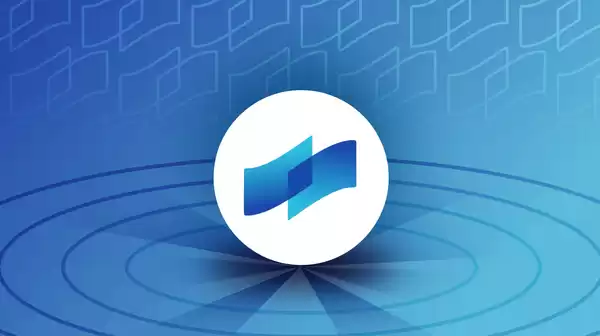-
 Bitcoin
Bitcoin $114200
0.00% -
 Ethereum
Ethereum $3637
0.56% -
 XRP
XRP $2.950
-2.01% -
 Tether USDt
Tether USDt $0.9999
0.02% -
 BNB
BNB $761.0
0.55% -
 Solana
Solana $164.1
-1.38% -
 USDC
USDC $0.9999
0.02% -
 TRON
TRON $0.3332
0.36% -
 Dogecoin
Dogecoin $0.2012
-0.52% -
 Cardano
Cardano $0.7261
-1.41% -
 Hyperliquid
Hyperliquid $37.62
-2.13% -
 Stellar
Stellar $0.3930
-2.65% -
 Sui
Sui $3.441
-0.16% -
 Bitcoin Cash
Bitcoin Cash $563.8
0.70% -
 Chainlink
Chainlink $16.50
0.09% -
 Hedera
Hedera $0.2424
-0.14% -
 Ethena USDe
Ethena USDe $1.001
0.01% -
 Avalanche
Avalanche $22.20
0.00% -
 Litecoin
Litecoin $118.0
-2.48% -
 UNUS SED LEO
UNUS SED LEO $8.991
0.12% -
 Toncoin
Toncoin $3.195
-3.87% -
 Shiba Inu
Shiba Inu $0.00001217
0.12% -
 Uniswap
Uniswap $9.674
-0.21% -
 Polkadot
Polkadot $3.633
1.00% -
 Monero
Monero $295.3
-0.82% -
 Dai
Dai $0.9999
0.00% -
 Bitget Token
Bitget Token $4.321
-0.41% -
 Cronos
Cronos $0.1392
0.73% -
 Pepe
Pepe $0.00001027
-0.89% -
 Aave
Aave $258.5
0.32%
How to sell COTI safely? COTI safe selling operation process
To safely sell COTI tokens, choose a reputable exchange, verify your identity, deposit tokens, place a sell order, monitor the order, withdraw funds, use a hardware wallet for enhanced security, enable 2FA for account protection, research the exchange, and beware of phishing scams.
Nov 20, 2024 at 12:08 pm

How to Safely Sell COTI tokens
COTI (COTI) is a cryptocurrency designed to facilitate the implementation of decentralized financial (DeFi) solutions. It powers the COTI Network, which provides a range of financial services, such as cross-chain swaps and stablecoins. If you're looking to sell your COTI tokens, here's a detailed guide to help you do so securely:
- Choose a reputable exchange:
Select a cryptocurrency exchange that supports COTI trading and has a strong track record of security and reliability. Some popular options include Binance, Coinbase, and Kraken. - Create an account and verify your identity:
Register for an account on the exchange and complete the required verification processes. This typically involves providing personal information, such as your name, address, and a government-issued ID. - Deposit COTI tokens:
Transfer your COTI tokens from your wallet to your exchange account. Follow the instructions provided by the exchange to initiate the deposit. - Place a sell order:
Navigate to the trading page for COTI and select the "Sell" option. Specify the amount of COTI you want to sell and the price you're willing to accept. You can choose between market orders (executed immediately at the best available price) or limit orders (executed at a specific price you set). - Review and confirm your order:
Before submitting your order, carefully review the details, including the price, quantity, and type of order. Once you're satisfied, click the "Sell" button to place your order. - Monitor your order:
Your order will be added to the exchange's order book. You can monitor its status by checking the "My Orders" section of your exchange account. If the order is successfully executed, the COTI tokens will be sold, and the proceeds will be credited to your account. - Withdraw your funds:
Once the sale is complete, you can withdraw the proceeds from your exchange account to your desired destination, such as a bank account or another cryptocurrency wallet. Follow the instructions provided by the exchange to initiate the withdrawal process.
Additional tips for selling COTI safely:
- Use a hardware wallet: Store your COTI tokens in a hardware wallet for enhanced security. Hardware wallets are physical devices that securely store your private keys offline.
- Enable 2FA: Ensure two-factor authentication (2FA) is enabled for your exchange account to add an extra layer of protection against unauthorized access.
- Research the exchange: Before choosing an exchange, do your research to verify its reputation, security measures, and trading fees.
- Beware of scams: Be cautious of phishing scams and other fraudulent activities targeting cryptocurrency users. Never share your private keys or sensitive information with anyone.
Disclaimer:info@kdj.com
The information provided is not trading advice. kdj.com does not assume any responsibility for any investments made based on the information provided in this article. Cryptocurrencies are highly volatile and it is highly recommended that you invest with caution after thorough research!
If you believe that the content used on this website infringes your copyright, please contact us immediately (info@kdj.com) and we will delete it promptly.
- Acapulco Crafts in Crisis: Sales Plummet, Artisans Struggle
- 2025-08-06 14:30:12
- SEC, Crypto & Bitwise CIO: A New Dawn?
- 2025-08-06 14:35:11
- Coinbase, Financing, and the Crypto Market: Navigating Choppy Waters in NYC Style
- 2025-08-06 12:50:11
- Bitcoin in Indonesia: Crypto Education and Economic Strategy
- 2025-08-06 12:50:11
- DeriW Mainnet: Zero Gas Fees Revolutionize On-Chain Derivatives Trading
- 2025-08-06 10:30:11
- IOTA, Cloud Mining, and Eco-Friendly Crypto: A New York Investor's Take
- 2025-08-06 10:30:11
Related knowledge

What is Ethereum’s Slashing mechanism and how to punish malicious behavior?
Feb 20,2025 at 03:08am
Key PointsOverview of slashingDifferent types of slashing in EthereumIncentives and consequences of slashingIdentifying and reporting slashed validato...

What is the verifier node of Ethereum and how to become a verifier?
Feb 19,2025 at 06:00pm
The Verifier Node of Ethereum: A Comprehensive GuideKey Points:What is a Verifier Node?How to Become a Verifier NodeResponsibilities and Rewards of a ...

What is Ethereum’s staking, and how to participate and earn money?
Feb 19,2025 at 04:37pm
Key Points:Understanding Ethereum's Staking MechanismSteps to Participate in StakingBenefits and Rewards of StakingSecurity and Risk ConsiderationsTec...

What is Ethereum’s DAO (Decentralized Autonomous Organization) and how does it work?
Feb 20,2025 at 03:12am
Key PointsDefinition and Structure of a DAOGovernance and Decision-Making in DAOsBenefits and Use Cases of DAOsChallenges and Limitations of DAOsWhat ...

What is Ethereum's multi-signature wallet and how to improve security?
Feb 20,2025 at 02:18pm
Key Points:Understanding the Concept of a Multi-Signature WalletBenefits and Drawbacks of Multisig WalletsRequirements for Setting Up a Multisig Walle...

What is Ethereum's oracle and how to provide data for smart contracts?
Feb 21,2025 at 01:30am
Key Points:Understanding the concept of oracles in EthereumExploring different types of oraclesDetailed guide on how to provide data for smart contrac...

What is Ethereum’s Slashing mechanism and how to punish malicious behavior?
Feb 20,2025 at 03:08am
Key PointsOverview of slashingDifferent types of slashing in EthereumIncentives and consequences of slashingIdentifying and reporting slashed validato...

What is the verifier node of Ethereum and how to become a verifier?
Feb 19,2025 at 06:00pm
The Verifier Node of Ethereum: A Comprehensive GuideKey Points:What is a Verifier Node?How to Become a Verifier NodeResponsibilities and Rewards of a ...

What is Ethereum’s staking, and how to participate and earn money?
Feb 19,2025 at 04:37pm
Key Points:Understanding Ethereum's Staking MechanismSteps to Participate in StakingBenefits and Rewards of StakingSecurity and Risk ConsiderationsTec...

What is Ethereum’s DAO (Decentralized Autonomous Organization) and how does it work?
Feb 20,2025 at 03:12am
Key PointsDefinition and Structure of a DAOGovernance and Decision-Making in DAOsBenefits and Use Cases of DAOsChallenges and Limitations of DAOsWhat ...

What is Ethereum's multi-signature wallet and how to improve security?
Feb 20,2025 at 02:18pm
Key Points:Understanding the Concept of a Multi-Signature WalletBenefits and Drawbacks of Multisig WalletsRequirements for Setting Up a Multisig Walle...

What is Ethereum's oracle and how to provide data for smart contracts?
Feb 21,2025 at 01:30am
Key Points:Understanding the concept of oracles in EthereumExploring different types of oraclesDetailed guide on how to provide data for smart contrac...
See all articles

























































































